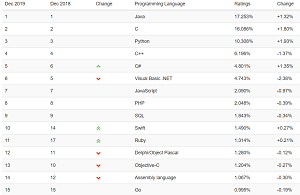News
C# Passes Visual Basic .NET in Programming Language Popularity Index
Microsoft's C# programming language has passed Visual Basic .NET on the TIOBE Index -- which measures language popularity -- and is even in the running for being named "Programming Language of the Year" for 2019.
That accolade won't be awarded until next month, but in the meantime, TIOBE published its December 2019 report that basically features the same cast of usual characters. In fact, the same four languages that top the December 2018 list also lead the December 2019 list in the exact same order: Java, C, Python and C++.
It isn't until position No. 5 that we see some movement, as C# took over fifth place from Visual Basic .NET, another Microsoft language that dropped to sixth, effectively transposing their rankings from last year.
Here's the top 15 languages from the new report:
 [Click on image for larger view.] TIOBE Index for December 2019 (source: TIOBE Index).
[Click on image for larger view.] TIOBE Index for December 2019 (source: TIOBE Index).
What's more, TIOBE indicated that C# was being considered for top language of the year along with other perennial favorites.
"TIOBE will announce the programming language of the year next month," the new report said. "There are 4 candidates for this title: Java (+1.3%), C (+1.8%), Python (+1.9%) and C# (+1.4%). These 4 languages are all in the top 5. Only C++ lost some ranking points in 2019. Python is top favorite for the title. It was already programming language of the year 2018, but its popularity keeps growing. This is mainly due to the lack of programmers in the world and the ease of learning this language if compared to other languages. C is also doing well thanks to the rise of Internet of Things. Why Java and C# are doing well is unclear, but it would be the first time that C# becomes the programming language of the year. Let's see what will happen next month!"
Here's the methodology behind the index: "The ratings are based on the number of skilled engineers world-wide, courses and third party vendors. Popular search engines such as Google, Bing, Yahoo!, Wikipedia, Amazon, YouTube and Baidu are used to calculate the ratings. It is important to note that the TIOBE index is not about the best programming language or the language in which most lines of code have been written. The index can be used to check whether your programming skills are still up to date or to make a strategic decision about what programming language should be adopted when starting to build a new software system. The definition of the TIOBE index can be found here."
About the Author
David Ramel is an editor and writer at Converge 360.